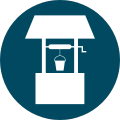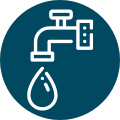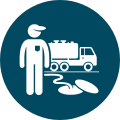
Our vision:
A safe and healthy Kitsap County for all.
Group B Water Systems
Drinking Water & Onsite Sewage
What You Need to Know About Properties Connected to a Septic System
A septic system is a critical part of a home. It collects, treats, and disposes of all water from toilets, sinks, tubs, showers, dishwashers, and other appliances.
Before buying or selling a home connected to a septic tank, make sure that you know the status of the septic system. Kitsap Public Health District can review records, inspect the system, and provide you with a written report of what we find. This is a great way to help protect your investment and follow regulations (Kitsap Public Health Board Ordinance 2025A-01, Section 13.D).
Before the final sale of a property, contact us for a property conveyance inspection (PCI) to identify any significant problems. Without an inspection, potential problems are not corrected and can cause major problems later on. For instance, a septic system my fail after new owners purchase a home, costing them thousands of additional dollars in repairs.
For us to perform a property conveyance inspection, we will need a record drawing. If your property does not have one, you will need to create one.
2025 Property Conveyance Inspection Findings
1,743 property conveyance inspections for septic were completed in 2025. Of those, 450 (27%) had significant deficiencies identified.
Avoiding Common Problems on Property Conveyance Inspections


Encroachment
Don’t build or park on your primary or reserve drainfield. Primary and reserve drainfield areas are intended to be maintained clear for maintenance and for future use.
Maintenance accessibility
For alternative systems, keep components accessible for maintenance.
Using beyond capacity or having unpermitted connections
Stay within the designed capacity of your drainfield design. To find out how many bedrooms your septic is approved for, search for your records through our GIS Search.
Do not add plumbing to outbuildings without project review and approval from Kitsap Health.
Compromised primary or reserve areas
Know where your septic areas are and protect them. To learn more about protecting those areas, review the Homeowner’s Guide
What You Need To Know About Properties Connected to a 1- or 2-party well or a Group B Water System
Effective March 4, 2019, all properties served by a Private or Group B Water System are required to have a Water Status Report from the Health District bfore they are sold.
Water Status Report applications (public and private) should be submitted 30 days before the property transfer to allow for any identified issues to be addressed before closing sale.
For more information, read our Private Water Status Report Frequently Asked Questions handout.
Just like a property conveyance inspection is important to know the status of a septic system, it is also important to evaluate your water system to identify significant problems.
2025 Private Water Status Report Findings
442 private water status reports were completed in 2025. Of those reports, 194 (44%) had significant problems identified.
Avoiding Common Problems on Private Water Status Reports
Construction Standards
Keep your well-head above grade and accessible (at least six inches above grade)


Well openings/access for contamination
Openings in the well casing/cap can allow contamination into the well. Ensure conduit, cap and all other entry points are sealed.
Ensure pressure tank maintenance is up to date and sample for bacteria annually. For more information about bacteria sampling, view our handout.

2025 Group B Water Status Report Findings
97 public water status reports for Group B systems were completed in 2025. Of those, 90 (93%) significant problems were identified.
Avoiding Common Problems on Public Water Status Reports
No user agreement
Group B user agreements have been required since 2019. All water systems should review their current user agreement or, if there isn’t one, create one. Learn more:
No operating permit
Group B water systems must have a current operating permit. Ensure water system contact information is up to date and the permits have been paid. For more information, visit our Group B Public Water Systems page.
No current samples
Most Group B water systems must sample annually for bacteria and every three years for nitrate. If you’re unsure of your sampling frequency or need technical assistance with taking samples, please call us at 360-728-2235 and ask to speak to the Drinking Water Inspector of the Day.
Reminder cards are mailed approximately 30 days prior to sample due date. Please make sure your system contact information is up to date.
Water Testing Requirements
All Group B water systems must test for bacteria annually and nitrate at least every 3 years.
Samples must be analyzed by an accredited laboratory.
It is the water system’s responsibility to ensure that sample results are sent to the Health District. Make sure that you put your water system ID number on the sampling slip and mark “Group B public water system” so samples can be correctly tracked.
You may have received a sampling reminder in the mail. If you have questions about the reminder card, please call us at 360-728-2235.
You can also email electronic versions of your sampling results to ossdw@kitsappublichealth.org
Group B Record Keeping
Keeping your records up to date is very important when managing a Group B water system.
The types of information that you should keep are:
All water test results
Annual Operating Permit
Water System easements and agreements
Protective well covenants
Plans of the water system and distribution layouts
Copy of the well log (contact us if you do not have one)
Flow test information
Records of past repairs of both the equipment and well
The Health District has records on each Group B water system in Kitsap County. The types of information we keep include water test results, contact information for the system, connection addresses, water system plans and recorded documents.
Scanned Group B water system files can be found online.
When information about your system changes, please let us know by:
Kitsap Public Health District
Attn: Drinking Water Program
345 6th St., Ste. 300
Bremerton, WA 98337
Phone
Annual Operating Permits
As of January 1, 2020, all Group B water systems need an annual operating permit.
The annual operating permit covers the costs associated with the Health District’s legal responsibility to perform public Group B water system administration. Administration of the Group B water systems includes:
Response to public complaints
Inquiries and records requests
Technical assistance to Group B water systems
Group B file maintenance
User Agreements
Effective September 4, 2019, Group B water systems were required to review their water system records and make sure that a User Agreement is in place between all users of the water system. If the user agreement is inaccurate or not present, an agreement needs to be updated or developed.
Read the Group B Water System User Agreement Information and Resources sheet for more information.
Group B Newsletters
Learn More
Learn more about Group B Water Systems at the Washington State Department of Health.










.png)
